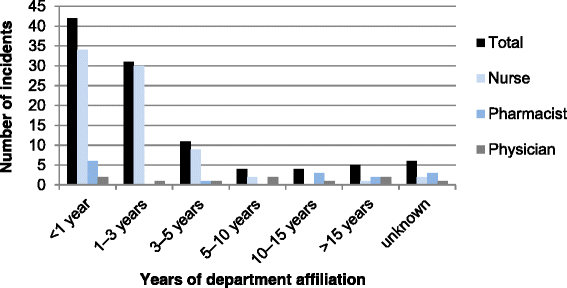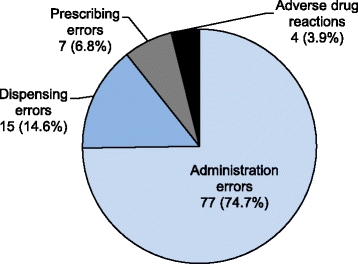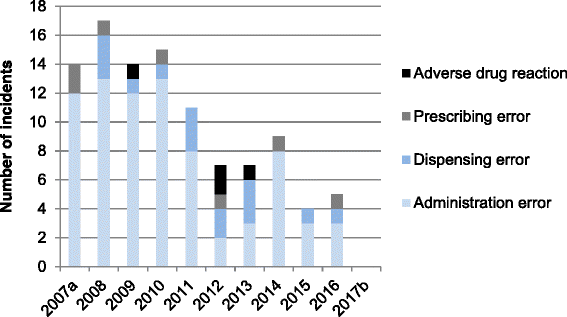Patient safety incident reports related to traditional Japanese Kampo medicines: medication errors and adverse drug events in a university hospital for a ten-year period
- PMID: 29268743
- PMCID: PMC5740942
- DOI: 10.1186/s12906-017-2051-2
Patient safety incident reports related to traditional Japanese Kampo medicines: medication errors and adverse drug events in a university hospital for a ten-year period
Abstract
Background: Kampo medicine is traditional Japanese medicine, which originated in ancient traditional Chinese medicine, but was introduced and developed uniquely in Japan. Today, Kampo medicines are integrated into the Japanese national health care system. Incident reporting systems are currently being widely used to collect information about patient safety incidents that occur in hospitals. However, no investigations have been conducted regarding patient safety incident reports related to Kampo medicines. The aim of this study was to survey and analyse incident reports related to Kampo medicines in a Japanese university hospital to improve future patient safety.
Methods: We selected incident reports related to Kampo medicines filed in Toyama University Hospital from May 2007 to April 2017, and investigated them in terms of medication errors and adverse drug events.
Results: Out of 21,324 total incident reports filed in the 10-year survey period, we discovered 108 Kampo medicine-related incident reports. However, five cases were redundantly reported; thus, the number of actual incidents was 103. Of those, 99 incidents were classified as medication errors (77 administration errors, 15 dispensing errors, and 7 prescribing errors), and four were adverse drug events, namely Kampo medicine-induced interstitial pneumonia. The Kampo medicine (crude drug) that was thought to induce interstitial pneumonia in all four cases was Scutellariae Radix, which is consistent with past reports. According to the incident severity classification system recommended by the National University Hospital Council of Japan, of the 99 medication errors, 10 incidents were classified as level 0 (an error occurred, but the patient was not affected) and 89 incidents were level 1 (an error occurred that affected the patient, but did not cause harm). Of the four adverse drug events, two incidents were classified as level 2 (patient was transiently harmed, but required no treatment), and two incidents were level 3b (patient was transiently harmed and required substantial treatment).
Conclusions: There are many patient safety issues related to Kampo medicines. Patient safety awareness should be raised to prevent medication errors, especially administration errors, and adverse drug events in Kampo medicine.
Keywords: Adverse drug event; Drug-induced interstitial pneumonia; Kampo medicine; Medication error; Patient safety incident report; Scutellariae radix.
Conflict of interest statement
Authors’ information
The Department of Japanese Oriental Medicine in the University of Toyama, to which all the authors belong, is a World Health Organization collaborating centre for traditional medicine.
Ethics approval and consent to participate
The study’s design was approved by the Ethics Committee of the University of Toyama (Reference no. 28-92). Due to the retrospective nature of this study, the need for informed consent was waived.
Consent for publication
Not applicable.
Competing interests
The authors declare that they have no competing interests.
Publisher’s Note
Springer Nature remains neutral with regard to jurisdictional claims in published maps and institutional affiliations.
Figures





References
-
- World Alliance for Patient Safety: forward programme 2005. World Health Organization, Geneva. 2004. http://apps.who.int/iris/bitstream/10665/43072/1/9241592443.pdf. Accessed 28 May 2017.
-
- WHO draft guidelines for adverse event reporting and learning systems: from information to action. World Health Organization, Geneva. 2005. http://apps.who.int/iris/bitstream/10665/69797/1/WHO-EIP-SPO-QPS-05.3-en.... Accessed 28 May 2017.
-
- Patient safety curriculum guide: multi-professional edition. World Health Organization, Geneva. 2011. http://apps.who.int/iris/bitstream/10665/44641/1/9789241501958_eng.pdf. Accessed 28 May 2017.
-
- Project to collect medical near-miss/adverse event information. Japan Council for Quality Health Care, Tokyo. http://www.med-safe.jp/contents/english. Accessed 28 May 2017.
-
- WHO traditional medicine strategy: 2014-2023. World Health Organization, Geneva. 2013. http://apps.who.int/iris/bitstream/10665/92455/1/9789241506090_eng.pdf. Accessed 28 May 2017.
MeSH terms
LinkOut - more resources
Full Text Sources
Other Literature Sources
Medical
Miscellaneous

